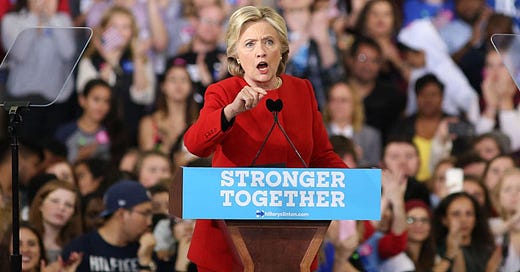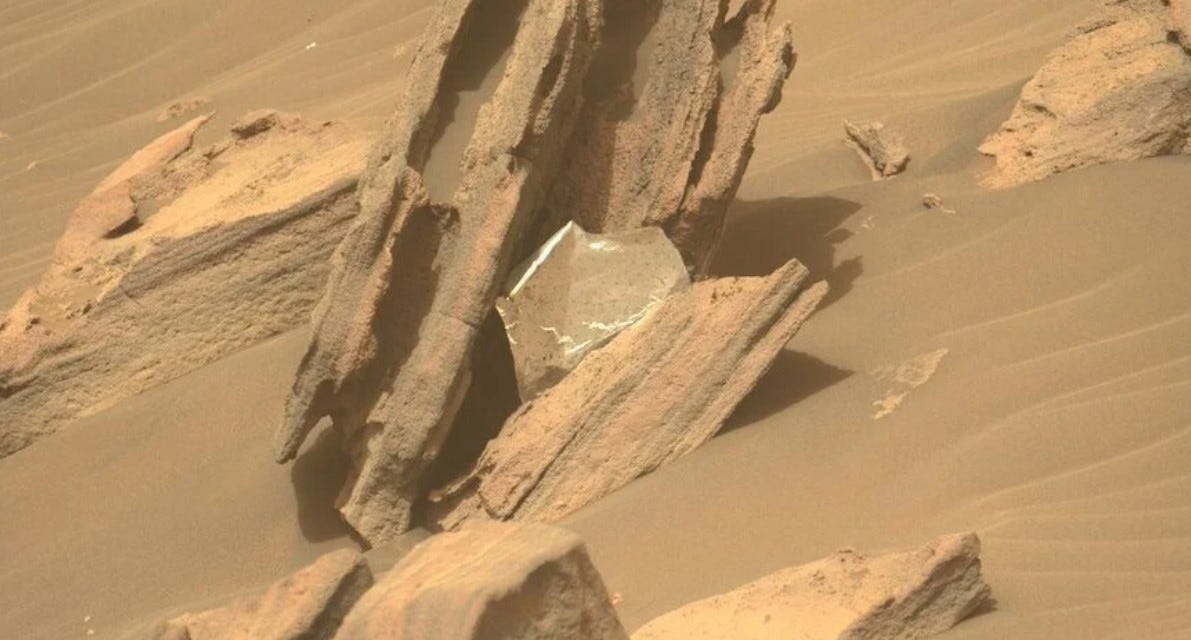Earthling: Hillary accused of hastening apocalypse
Plus: Trash on Mars; fake real meat; Ukraine's military plight; etc.
This week I taped a conversation with Matt Duss, Bernie Sanders’s foreign policy adviser, about his much discussed New Republic piece on why the left should support military aid to Ukraine. Paid newsletter subscribers can get the audio or video version, along with a partial transcript, here (and can get the audio version in podcast apps via the newsletter’s feed). The conversation will be publicly available late Tuesday in the Wright Show podcast feed and on the bloggingheads.tv YouTube channel.
–Bob
In Jacobin, Branko Marcetic argues that Hillary Clinton has helped “send already bad US-Russia relations to new lows, with perilous potential consequences for international relations generally and the risk of nuclear confrontation in particular.” She did this, writes Marcetic, by planting the seeds of Russiagate during the 2016 presidential campaign—working, sometimes behind the scenes, to convince voters that Donald Trump was in effect a Russian operative. One result was to instill in many Democrats an animosity toward Russia that was once more common among Republicans.
Clinton and her campaign weren’t the only ones fomenting fears of Trump-Russia “collusion.” But, Marcetic says, recent revelations suggest she was decisive in getting them to critical mass. In May, Clinton campaign manager Robby Mook testified that she personally approved giving the media the (at best) unverified story that Trump had a communication line to the Kremlin via the Russian Alfa Bank. Combined with other dubious reports of Trump-Russia ties, the Alfa Bank story set in motion a years-long media-driven drama that Marcetic believes made a rational Russia policy less likely. Hillary had helped link “public perceptions of Russia to America’s poisonous domestic partisan warfare.”
“Even now,” he writes, “the United States is unique in the world for the way ‘negotiation’ is a dirty word—an attitude that, in a marked reversal from the Cold War years, is overwhelmingly concentrated in liberal circles.”
NASA’s Perseverance rover has discovered trash on Mars—and subsequent investigation implicated the rover itself in the planet’s defacement. As Perseverance explained on its Twitter feed, “My team has spotted something unexpected: It’s a piece of a thermal blanket that they think may have come from my descent stage, the rocket-powered jet pack that set me down on landing day back in 2021.”
Meanwhile, back on Planet Earth, plastic and tar have combined into a new form of pollution—“plastitar,” as it’s called in a scientific paper on the novel blight. Scientists on the Spanish Canary Islands found plastic-spotted balls of hardened tar scattered across several beaches.
One researcher explained the cause: The residue of oil spilled in the ocean “acts like Play-Doh” as it washes ashore, collecting microplastics (polyethylene or polypropylene) on its sticky surface. Plastitar is only the latest hybrid contaminant; plastiglomerates, for example, are formed from melted plastic, beach sediment, and fragments of basalt lava.
Stephen Wertheim writes in the Atlantic that the US should stop casting its support for Ukraine as part of a global struggle between democracy and autocracy, and instead emphasize “Russia’s most fundamental offense”—violating international law by invading a sovereign nation.
This reframing, says Wertheim, would help Biden build a broader anti-Putin coalition, since the current framing suggests to some governments that Biden considers their sovereignty “worthy of support only if they qualify as democratic in the eyes of the West.” The reframing could also facilitate a negotiated end to the war, writes Wertheim, since treating Ukraine as the front line of a fight against autocracy implies that compromise is not an option.
Far be it from the humble Nonzero Newsletter to suggest that it is ever ahead of the curve, but NZN did, back in April, argue for the same reframing. However, it also judged that the “democracy vs. autocracy” meme’s permeation of the Blob had reached the point of no return; resistance seemed futile. Wertheim, in contrast, has commendably refused to give up the fight. So the global struggle between good framings and bad framings continues.









